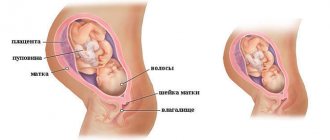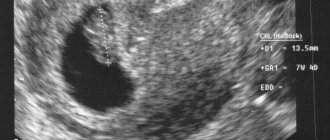Interesting Facts
| Options | Indications |
| Time from conception | 38 weeks |
| Period by month | 40 weeks |
| What month | 9 |
| Dimensions and weight of the fetus | 515 mm, 3685 g |
| Uterus dimensions | VDM - 36-38 cm |
| Pregnant weight | Gain from the beginning of pregnancy is 10-15 kg; over the last week 200-300 g |
The fortieth week of pregnancy ends with the long-awaited PDP - the approximate date of birth, calculated taking into account the date of your last menstruation and ultrasound data. The baby is already completely ready for life outside the womb, but since science still does not know exactly what is the “trigger mechanism” for the onset of labor, we can only be patient and wait. Let's find out what happens to a woman and fetus at 40 weeks of pregnancy.
When to induce labor
Childbirth can be induced for medical reasons. For example, if continuing the pregnancy would be harmful to you or your baby.
The doctor decides to induce labor
Other reasons:
- If two weeks have passed since your expected due date, induction may be recommended to avoid pregnancies beyond 42 weeks. The placenta can no longer fully perform its usual function, which means that the fetus may be in a state of hypoxia and suffocate in utero if delivery is not carried out on time.
- Premature rupture of membranes. This means that the amniotic fluid has left the uterine cavity, which means the anhydrous period has begun. From this moment on, the woman has 12 hours to give birth on her own. If labor occurs with weak labor or no labor at all, the doctor can stimulate labor with medication or other means.
- Infection in the uterus, placenta, or amniotic fluid.
- Slowing of fetal growth and developmental delay.
- You become diabetic during pregnancy (gestational diabetes).
- Low water.
- Hypertension of varying degrees or gestational hypertension.
- Preeclampsia.
- Placental abruption. A condition in which the placenta separates from the inner wall of the uterus before birth.
Feelings of the expectant mother
If your stomach has already dropped, then it has probably become easier for you to breathe, heartburn and heaviness in the stomach have disappeared. However, due to the fact that the fetus now puts more pressure on the intestinal area and bladder, you want to go to the toilet much more often.
An unpleasant symptom of the 40th week of pregnancy may be pain in the perineum. It occurs again due to the pressure of the descending fetus, as well as under the influence of the hormone relaxin, which makes the bones and ligaments of the pelvis softer and more flexible.
Other prenatal signs at 40 weeks of pregnancy include:
- false contractions - you feel your stomach hardening and your lower back tightening, but the pain occurs chaotically, has no periodicity and subsides over time;
- discharge of the mucus plug - a jelly-like clot, white, transparent or pinkish with bloody streaks - can occur simultaneously or over several days, accompanied by nagging pain;
- a decrease in body weight by 1-1.5 kg due to the removal of excess fluid - you will notice how swelling has decreased, and the stool may become more liquid.
Precursors of labor in multiparous women usually appear 1-2 weeks earlier. An experienced mother can already distinguish them from other conditions. But we note that everything is very individual: many women do not experience any changes during pregnancy until the day the baby is born.
What happens to the expectant mother
You may likely feel a little nervous. This is due to the unpredictability of childbirth. They can start at any moment, and a woman should be prepared for this. But the expectant mother cannot stay at home until the very beginning of labor. And while heading to the store or walking down the street, she cannot put aside the thoughts of what will happen if “she has to give birth right here and now.” In order to save yourself from these worries and anxieties, try not to go far from the house, where the collected things are located and where you can call an ambulance. And you can ask one of your family or friends to go to the store. But just in case, always carry with you your exchange card, which stores all the data about the course of your pregnancy.
The belly is no longer growing at 40 weeks of pregnancy . A woman can observe stretch marks on him that have appeared, even despite the use of special products. What can you do, sometimes the predisposition to the formation of stretch marks is stronger than creams and gels. But try not to get upset if you encounter this defect. After giving birth, purple stretch marks will begin to fade and become smaller in size as the skin tightens.
Discharge at 40 weeks of pregnancy
And this week you should pay close attention to the changes that women sometimes notice during pregnancy. No mother wants her baby to become infected with anything. Therefore, if your discharge changes, you should immediately discuss this with your doctor. In addition, in the last stages, when the baby is about to be born, it is important to have time to react to this. So, what should you be wary of?
- White and curdled discharge indicates an increase in the number of candida, which are normally present in small quantities on the vaginal mucosa. Thrush needs to be treated so that when moving through the birth canal the child does not “pick up” it.
- Green and unpleasant-smelling discharge is a sign of an inflammatory process. This can also affect the baby’s health, so it is important to identify the problem and get rid of it.
Particular attention should be drawn to the presence of a lump of mucus on the pad and watery discharge. The mucus plug may come off before labor begins, but this indicates its approach. After the mucus is discharged, the volume of which is on average 1-2 tablespoons, you need to be much more careful about hygiene and should refuse sex in order to avoid infection through the cervix. And the release of clear liquid indicates leakage or discharge of amniotic fluid, depending on the amount of discharge. In the second case, we can definitely talk about the beginning of labor, so go to the maternity hospital without delay. And if water leaks, you need to discuss this with your doctor so as not to encounter possible consequences.
Separately, it is necessary to say about blood at 40 weeks of pregnancy. In general, the appearance of bloody discharge indicates a serious problem in the pregnant woman’s body. Such a dangerous pathology as placental abruption cannot be ruled out. This may occur due to the low position of the child's seat or due to increased myometrial tone. An ultrasound reveals detachment, so be sure to call an ambulance if you notice blood on the pad.
The belly becomes hard at 40 weeks of pregnancy
Thus, many pregnant women experience increased uterine muscle tone. Why does it occur? As the fetus grows, the uterus also increases in size. In this regard, her muscles react more sensitively to any physical activity. And at this time they become tense even after a short walk. That is why in the third trimester women are advised to be careful with loads, and are also advised not to carry heavy loads.
If your stomach feels tight at 40 weeks of pregnancy, and the muscles don’t even think about relaxing, it is quite possible that this can lead to childbirth. The stomach can also be pulled during Braxton-Hicks contractions, which we have mentioned more than once. Only now they can be painful, which also indicates the imminent onset of labor. To distinguish training contractions from real ones, you need to time their duration and the interval between them. If they go away some time after they start, these are training contractions. But when they start to last 5 minutes and the interval between them decreases to 1 minute, get ready for the maternity hospital, and quickly.
Fetal development
The baby’s motor activity decreases at 40 weeks of pregnancy, and at times it even seems to you that the baby has become quiet. There is not enough free space for him in the uterus, in addition, the nervous system is so developed that the fetus itself can coordinate its movements, which means there are no longer many chaotic movements that were before.
Every day the tissues of the placenta become older and thinner, and the fetus may lack nutrients and oxygen. Therefore, the skin of many newborns is bluish in color - this is how incipient hypoxia manifests itself. But don't worry: after 1-2 days it will turn naturally pink.
The baby trains the sucking reflex every day by holding his finger in his mouth. Newborns also have an innate search reflex - if you touch the corner of the baby’s mouth or lips, he will turn his head towards the stimulus and open his mouth slightly. These are one of the main involuntary reactions of the body necessary for nutrition.
Tests and ultrasound
At 40 weeks, you will most likely visit the gynecologist who managed your pregnancy for the last time. He will carry out a number of usual procedures:
- examine the abdomen and evaluate how the fetus lies;
- listen to his heartbeat;
- measure your blood pressure and weight;
- interpret the latest urine test;
- will give the latest recommendations on lifestyle and when to go to the hospital.
If the doctor evaluates the condition of the cervix, then after the examination you may feel a tug in your stomach. It's not very pleasant, but it will go away on its own. The specialist will see if gradual opening begins.
Ultrasound
If a woman feels well and does not have any pregnancy pathologies, then an ultrasound examination is not required at this time. Although some experts recommend undergoing an ultrasound to assess the condition of the placenta. After all, every day it wears out more and more and ages. Naturally, this affects its functioning, and therefore the child’s well-being. For example, he may begin to suffer from oxygen starvation, which leads to depression of brain activity, disturbances in the functioning of the heart, and sometimes even to the death of the fetus.
If an ultrasound is performed to assess the condition of the placenta, then the doctor will definitely examine the baby himself, clarify his parameters, and eliminate the slightest possibility of the umbilical cord entwining the baby’s neck. It is equally important to monitor the quality and volume of amniotic fluid and the readiness of the cervix for the upcoming birth.
During an ultrasound, a woman will be able to clearly see her baby, if the equipment allows it. At this time, his facial features and all parts of the body are perfectly formed.
Immediately after birth, the mother may be embarrassed by the baby's appearance. For example, his body is sometimes covered with fluff, his skin is spotted or bluish in color, his genitals are often swollen, and fluid is released from his nipples. The baby's head may be irregular, slightly elongated. There is no need to worry about this; in the near future all these “frightening shortcomings” will go away on their own.
After birth, you need to insist that the baby be put to the breast immediately. This is very important not only for the baby, but also for the woman herself. With the first drops of colostrum, the intestines will be populated with beneficial bacteria; in addition, this is a very emotional and touching moment.
Immediately after birth, the baby is washed, the airways are cleared, dressed, and drops are placed in the eyes to prevent the development of infection. The condition of the newborn is assessed by doctors using the Apgar scale. Then a tag is put on the baby, which indicates the mother’s last name, medical card number, height and weight of the child, as well as his gender. From this moment you can begin to enjoy the great happiness in the life of every woman - motherhood.
Other tests.
At this time, the woman will need to undergo a general urine test and a general blood test, which will ensure the normal functioning of the body. She also needs to visit a gynecologist who will take measurements of the abdomen and pelvis. As necessary, the cervix is examined and its readiness for childbirth is assessed.
What to discuss with your doctor
If you are experiencing severe anxiety, stress or fear, you should consult a perinatal psychologist. Such a specialist works in many maternity hospitals and antenatal clinics. A tense psychological state during pregnancy, hormonal changes in the body after the birth of a baby and overwhelming worries, coupled with fatigue, can lead to postpartum depression. Therefore, do not attribute everything to a bad mood. If you often feel inexplicably sad, cry and worry, be sure to seek help.
When to go to the maternity hospital
The beginning of labor is considered to be contractions - regular and increasing. That is, if tension in the abdomen occurs with a certain frequency and does not subside, then you need to compare 3 adjacent contractions and two periods of time between them. Contractions should be approximately equal in strength, length, frequency and interval between them. The training ones will subside in an hour, but the real ones will increase.
If you are expecting your first child, then you should go to the maternity hospital when the interval between contractions is 10 minutes. In other cases, it is better to do this in advance, during the first periodic contractions: each subsequent birth is faster than the previous one.
When should you especially hurry?
If labor does not begin on its own and the pregnant woman is not worried about anything, then she is usually asked to come to the maternity hospital on her own at 41 weeks and 5 days, when the question of additional medical stimulation of labor will be raised. However, there are symptoms in which you should immediately contact the maternity ward:
- brown or red discharge.
- leakage of amniotic fluid is an especially alarming sign - if it is opaque, with a greenish tint. Be sure to report this upon admission to the maternity hospital.
- increased blood pressure and rapid pulse.
- nausea and vomiting against a background of general weakness are possible symptoms of oligohydramnios.
Harbingers of childbirth
It is unlikely that you will suddenly go into labor suddenly without any warning. Nature has thought of everything for us, and your body will definitely tell you that it’s time to check your bag, documents and go to the maternity hospital.
Harbingers as a bell about the beginning of labor
Although every woman is unique, you may notice some signs that labor may be starting in the next few days. These signs are called labor warning signs, and they include the following:
- Energy lability. If you feel extremely tired and then experience a sudden burst of energy in the days or weeks before giving birth, this is completely normal.
- Nesting. You may also feel the urge to nest and prepare your home for the baby. Although nesting can begin at any time during pregnancy, many women experience it just before giving birth. Don't overexert yourself. Just rest and save your strength for the upcoming birth.
- Abdominal prolapse. Your baby descends into your pelvis several weeks, days, or hours before birth. This event is popularly called prolapse of the abdomen. If a palm fits freely between the chest and the top of the abdomen, then the baby has descended into the pelvic cavity and is ready to be born.
- Removal of the mucus plug. You may notice a thick, pinkish or bloody discharge called a mucus plug. It covered the cervix during pregnancy.
- The desire to go to the toilet due to great need. This is caused by the baby's head pressing on your intestines.
In primiparas
Nesting in first-time mothers, as a rule, appears almost from the very beginning of pregnancy. This can be explained by the fact that a woman who has become pregnant for the first time does not yet know what a small child is and what she may definitely need for the first time to care for a newborn, and the purchase of which can be postponed until better times.
Abdominal prolapse also occurs gradually, and the mucous plug usually begins to come off two weeks before the expected date of birth.
Preparing things for the baby during the nesting period
In multiparous women
For women who are not expecting their first child, nesting is not a mandatory attribute of pregnancy, but still appears just closer to childbirth. The belly drops quite quickly a few days or even hours before birth, and the mucous plug often comes off at the moment of rupture of amniotic fluid already on the chair in the maternity ward.
Important! But we must not forget that each pregnancy is unique, and even the same woman in her first pregnancy may not have all the usual warning signs of a first-time mother, while in a multiparous mother these same signs will appear a couple of weeks before the visit to the maternity hospital.
How to speed up labor at 40 weeks pregnant
If you are 40 weeks pregnant and still not in labor, you probably have a desire to give birth quickly. We ask you not to force events and not to resort to dangerous “folk” methods. Castor oil or heavy lifting will only lead to poisoning or bleeding.
Walking and intimacy are considered relatively safe methods. Many mothers share their experience that it was after long shopping trips or sex that the long-awaited contractions began. Some resort to acupuncture and nipple stimulation methods.
However, we cannot call this approach scientifically sound and correct from a medical point of view. If the child missed the birth date, then it is safest to rely on medical stimulation under the supervision of doctors.
Possible problems
Closer to home, the expectant mother may have a number of problems that should be resolved with the doctor who is managing the pregnancy. Below are some of them.
Discharge
Discharge during pregnancy, usually white or almost white, may increase in volume closer to the due date. They are significantly different from the mucus plug, which can be pink and sometimes red.
Changes in the color (green/yellow) or odor of the discharge may indicate an infection. It's best to check with your midwife or doctor about any unusual discharge, as clear, watery discharge can also be a sign of an amniotic fluid leak.
Pain
The baby is located closer to the cervix and actively moves in its lower part. These movements will likely cause you to feel some pressure in your pelvic area. It is not uncommon for the lower part of the uterus to put pressure on some of the nerves in the area, causing some pain and discomfort.
Episodic pain in a pregnant woman
Pain can also signal the onset of some pathological process, so if you have the slightest doubt, consult a antenatal clinic doctor or a maternity hospital.
Diarrhea
In previous weeks, you most likely struggled with constipation, but this time the situation may be exactly the opposite. Your intestines will be cleared, and the baby will be able to freely descend into the pelvic cavity. This is usually a sign that the real contractions are approaching - the time when the baby will come out and face the world.
Edema
Quite often, pregnant women at 40 weeks complain of the appearance of edema. This is due to the fact that the child is already quite large and is capable of compressing the lymphatic vessels and disrupting lymph circulation.
If you have severe swelling, it appears suddenly, especially in the face and also in the arms and legs, or is accompanied by a headache, vision problems, or you may have preeclampsia. In this case, you should immediately call your midwife, doctor or ambulance.
Swelling, which commonly occurs during pregnancy, can be reduced by doing the following:
- Lie on your left side. This position will move the uterus away from the large vein that returns blood to the heart (inferior vena cava).
- Rest frequently with your feet elevated.
- Wear elastic support stockings.
- Wearing loose clothing that does not restrict or impede blood flow, especially to the legs (for example, do not wear socks or stockings that leave streaks around the ankles or calves). In principle, no one wants to wear such socks.
Compression stockings
Checklist for 40 weeks of pregnancy
- To prevent constipation and the development of hemorrhoids at 40 weeks, watch your diet and drinking regime. Don't forget about fiber, which is found in unrefined grains, vegetables and fruits.
- Make sure your mobile phone is always charged, and don't forget to take your charger with you to the hospital.
- Make sure that you have collected all the things for the maternity hospital, as well as documents: passport, medical policy, birth certificate or contract for paid medical services, exchange card.
- Get plenty of rest, sleep at least 8-9 hours, stay calm and think only about good things.
You have come a long way, there is very little left and you will see your long-awaited baby!










